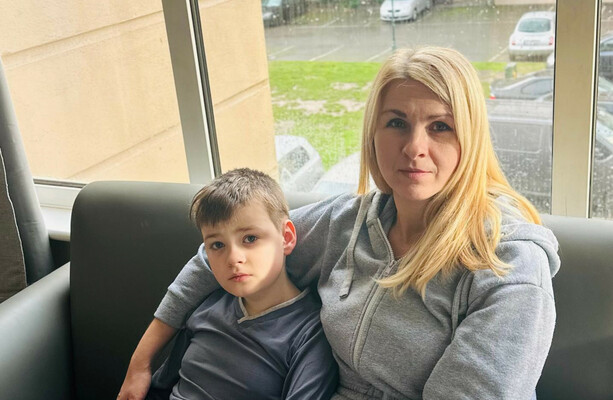Ukrainians in Ireland Face Uncertain Future as Accommodation Scheme Nears End
Thousands of ukrainian refugees in Ireland are bracing for potential homelessness as the government’s Accommodation Recognition Payment (ARP) scheme is set to expire on March 31, 2025. The scheme, which provides €800 per month to Irish families hosting Ukrainian refugees, has been a lifeline for nearly 36,000 displaced individuals. However, with no decision yet on its extension, many fear they will be left without shelter.
Support groups have described the situation as a “deplorable limbo,” with refugees living on a “cliff edge” as they await clarity on their future. “ukrainians are terrified they’ll be abandoned,” said one advocate, highlighting the anxiety gripping the community.
In Cork, around 300 refugees—mostly women and children—were recently informed they must leave their temporary accommodation in a former student village. The news has left many in shock and sadness, with one resident stating, “We don’t know where we’ll go next.”
The government has indicated that a decision on the future of the ARP scheme will be made “in the next couple of weeks.” Though, the delay has only heightened concerns. “If the scheme is not extended, we could see thousands of Ukrainians facing homelessness,” warned a spokesperson from a refugee support institution.
The potential end of the scheme has also raised questions about Ireland’s commitment to supporting those fleeing the ongoing war in Ukraine. critics argue that failing to extend the program would not only leave refugees vulnerable but also strain Ireland’s already overburdened housing system.
Key Points at a Glance
Table of Contents
| Issue | Details |
|————————————|—————————————————————————–|
| Accommodation Scheme | €800 monthly payment to hosts of Ukrainian refugees, set to expire March 31 |
| Number of Refugees Affected | Nearly 36,000 |
| Current Status | Government decision pending |
| Concerns | Potential homelessness, lack of clarity |
as the clock ticks down to the march deadline, the fate of thousands of Ukrainian refugees hangs in the balance. Advocates are urging the government to act swiftly to avoid a humanitarian crisis. “We cannot let these families fall through the cracks,” said one campaigner.
For now, the ukrainian community in Ireland remains in a state of uncertainty, hoping for a resolution that ensures their safety and stability.
Call to Action: Stay informed about the latest developments by following updates on the ARP scheme and its impact on Ukrainian refugees. Your voice can make a difference in ensuring these families are not left without support.
Interview with a Refugee Advocate on the ARP Scheme’s Impact
Editor: Can you explain the significance of the Accommodation Recognition Payment (ARP) scheme for ukrainian refugees in Ireland?
Advocate: Absolutely. The ARP scheme has been a lifeline for nearly 36,000 Ukrainian refugees in Ireland. It provides hosts with €800 per month to accommodate displaced individuals and families. This financial support has allowed many refugees to find temporary shelter, especially women and children who make up a significant portion of the displaced population. However, with the scheme set to expire on March 31, 2025, there’s growing anxiety about what comes next.
Editor: What are the immediate concerns if the scheme isn’t extended?
Advocate: The primary concern is homelessness. Many refugees are already living in a state of uncertainty, and the potential expiration of the ARP scheme puts them on a “cliff edge.” For example, in Cork, around 300 refugees were recently told they must leave their temporary accommodation in a former student village. These individuals don’t no where they’ll go next, and without the financial support that the ARP provides, hosts may be unable to continue offering shelter. This could lead to thousands of ukrainians being left without a place to stay.
Editor: how has the delay in the government’s decision impacted the refugee community?
Advocate: The delay has onyl heightened the anxiety and fear within the community. Many are living in a “deplorable limbo,” as one advocate described it. They are terrified of being abandoned and left to fend for themselves. The government’s indication that a decision will be made “in the next couple of weeks” is not enough. Immediate clarity is needed to provide these families with a sense of security and to allow them to plan for their future.
Editor: What broader implications could the end of the ARP scheme have for Ireland?
Advocate: Beyond the humanitarian crisis it would create, the end of the ARP scheme could strain Ireland’s already overburdened housing system. with thousands of refugees potentially becoming homeless, the demand for housing would increase dramatically.This could exacerbate the existing housing crisis and put additional pressure on social services. Furthermore, it raises questions about Ireland’s commitment to supporting those fleeing the ongoing war in Ukraine. Failing to extend the program could be seen as a lack of solidarity with a vulnerable population in need of protection.
editor: What actions are advocates urging the government to take?
Advocate: Advocates are urging the government to act swiftly to extend the ARP scheme. We cannot let these families fall through the cracks. Immediate action is needed to prevent a humanitarian crisis and to ensure that Ukrainian refugees continue to receive the support they need. We also encourage the public to stay informed about the latest developments and to use their voices to advocate for these families.Public awareness and pressure can play a crucial role in influencing government decisions.
Conclusion
The fate of thousands of Ukrainian refugees in Ireland hangs in the balance as the ARP scheme approaches its expiration date. Advocates are calling for urgent government action to extend the program and prevent a potential wave of homelessness. The situation highlights the need for continued support for refugees and the importance of public advocacy in ensuring their safety and stability.


